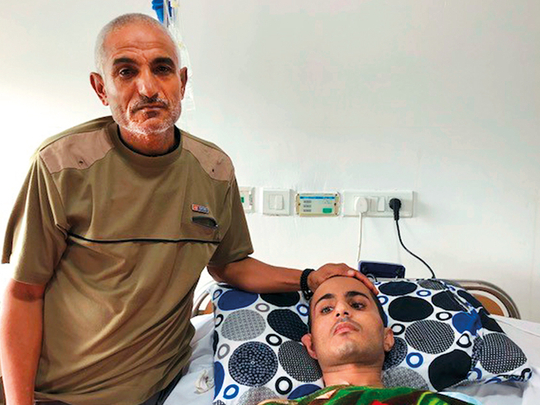
New Delhi: Some have lost their limbs, some lost their eyes and several others their mind, but after spending considerable time rehabilitating in India as part of the UAE government’s humanitarian mission, Yemeni war victims are going back home with renewed hope.
A batch of 74 injured Yemenis, civilians as well as soldiers, arrived in New Delhi in early July to receive advance treatment at various branches of VPS Rockland group of hospitals, which is facilitating the Emirates Red Crescent’s mission to heal the wounds of the three-year-old conflict.
The mission has provided treatment to more than 3,000 war victims so far, including 250 who have recuperated in India since April last year.
When arrived, the latest batch, fifth in the last 15 months, had victims suffering from a range of issues, including psychological trauma, lost memory, lost limbs as well as eyes.
There were also a couple of patients in coma, one of whom has recovered, but the other is yet to respond.
At VPS Rockland Hospital in Delhi’s Saket area, an entire floor has been dedicated for the Yemeni war victims, complete with an entertainment room, board games, a prayer area as well as Arabic food.
“We have a team of 70 doctors working with the patients, many of whom arrived in deep trauma and terrible physical conditions. We are doing whatever we can to make their lives better,” said Jassar Saleh, a Yemeni national coordinating the humanitarian mission for VPS.
On the third floor of the multi-storey hospital in the heart of New Delhi, patients are lying on hospital beds, some happy to find that they are going back home soon, while many other dreary-eyed victims hoping that their turn will come soon.
Majd Talal Saleh, a 27-year-old general physician who until 18 months back healed others, is in a state of coma.
- Talal Saleh Hassan | Majd’s father
When his father, a 55-year-old schoolteacher, speaks with Gulf News from his bedside, Saleh opens his eyes, looks blankly and goes back to his stupor.
“I am not sure if he registers anything that is happening around him. He is responding to the treatment slowly and his condition is slightly better than it was when we brought him here, but it seems he will take longer to come out of this state,” said Talal Saleh Hassan, speaking to Gulf News through a translator, his eyes reflecting both hope and angst.
Eldest of Hassan’s seven children, Saleh was on his way to join the Yemeni Army to fight against Al Houthi rebels, when the vehicle he was travelling in met with an accident, leaving him immobile.
Lying next to Saleh in the twin-room is 41-year-old Nadim Abdullah, a civilian who was fighting alongside the Yemeni soldiers, when he was hit by bullets on his spine during a combat last Ramadan.
“It was the 27th day of Ramadan last year. I was part of a group guarding a position in Aden, when we were ambushed by Al Houthis, we managed to fight back but I got hit during fighting. Luckily, all the others were safe,” said Abdullah, who arrived in Delhi in a semi-vegetative state, but has since recovered considerably.
Though, still months away from getting back on his feet, Abdullah yearns to go back and see his mother.
Unlike Abdullah and Saleh, who will have a longer stay in Delhi, some of the patients who arrived earlier this month have already left after completing their treatment and some others are getting ready to leave.
Ammar Abdullah Askar and Mohammad Ali Futtaimi are among the group of patients who will head back home in a week after receiving their prosthetic limbs.
Returning from a shopping trip from the bazaars of Delhi, Askar seemed happy to have finally stepped out.
“It was nice to go out and feel the fresh air after a while. I am fully fit now and keen to make most of what life throws at me. Though, it won’t be the same with an artificial hand, but I am grateful to Allah almighty for sparing my life,” said the 32-year-old civilian who volunteered to fight and lost his left hand during a close combat with Al Houthis.
Unlike Askar, Futtaimi has lost his left leg, but more than the physical disability the trauma of war has put a dent on his mental faculties as it was visible by the ruckus he created during our visit to the hospital.
According to a UN report, Yemen’s civil war has killed more than 5,000 civilians and injured around 8,000 others, leaving many permanently disabled.
But more than the physical wounds, the scars of the conflict run deep on the psyche of its civilians.







